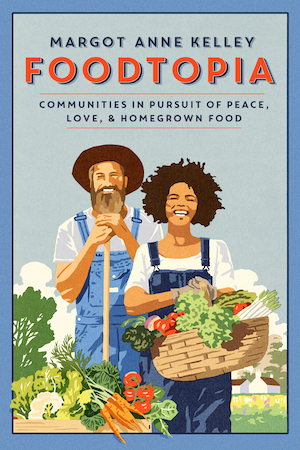
Communities in Pursuit of Peace, Love, & Homegrown Food”
By Margot Anne Kelley
David R. Godine, 2022
384 pages, hardcover, $28.95
Assembled around five back-to-the-land movements from the 1840s into the 2010s and the pandemic years, “Foodtopia” is an exploration of utopian experiments that use food as a means to create a more just and equal world. Woven together with the common thread of food as a means to a better reality, Kelley presents the reader with interesting and entertaining illustrations of these movements — such as Bronson Alcott’s (father of Louisa May) Fruitlands, Henry David Thoreau’s project at Walden Pond, Scott and Helen Nearing’s honing of “the good life,” the hippies and back-to-the-landers of the 1960s and ‘70s, and the Good Food Movement and food activists of present — with numerous examples based in Maine, including the creation of MOFGA.
A vital commonality throughout is each movement’s deep commitment to equality, justice and freedom, with the recognition that food is an essential medium to enact these ideals. Their work to amplify their efforts and beliefs influenced future generations of dreamers who in turn reshaped the vision and carried it forward. It is fascinating how similar these visions are — honoring the connections between mind, body and spirit — and the urgent need to address social inequalities — gender, race and environmental degradation by changing or recreating food systems.
Kelley’s synopsis of each movement is filled with intriguing details and textures. Such as, in his exuberance, Thoreau planted seven miles of bush beans, or, during World War II anthropologist Margaret Mead worked for the federal government to shape a national identity through school lunch programs; spicy food was deemed unhealthy, and Mead recommended “low toned foods” that have “low emotional value.” Equally compelling is following Kelley as she visits places connected to the groups and people highlighted in “Foodtopia.”
Kelley was careful to weave into each section connections and commonalities of back-to-the-land movements throughout time, which serve a larger metaphor — that at any given moment, the past and present co-exist. An effective structure for the book, it also serves to push back against a myopia-of-the-present, a prevalent historical illiteracy which dooms us to a purgatory of incessant reinvention. We see that the past isn’t irrelevant, but constantly informs the present. The continuum of ideals in “Foodtopia” is a flexible thread rather than a linear progression, having directionality yet allowing discreet pieces to be companions of the same moment. As braiding and weaving teaches us, this brings resiliency.
Good intentions, however, can have blind spots. While reading I wondered about the larger conversation around colonial strategies that involved farming and food systems and the devastating human and environmental consequences that continue to unfold as a result. Such efforts created conditions in which utopian experiments could occur. How do unacknowledged biases complicate utopian ideals? In the section on Thoreau, Kelley reproduced some of his musings on vegetarianism, which included, “Savage tribes have left off eating each other when they came in contact with the more civilized.” Thoreau viewed vegetarianism as a more highly evolved form of human behavior. How did this perspective play out in his day-to-day actions? How should we situate his legacy in this racist framework of rationalization? How do similarly skewed perspectives play out in our own lives? Who is overlooked and left out of our utopian visions?
Catherine Preston-Schreck, Bar Harbor, Maine
